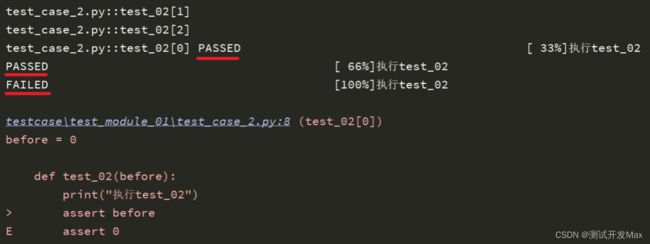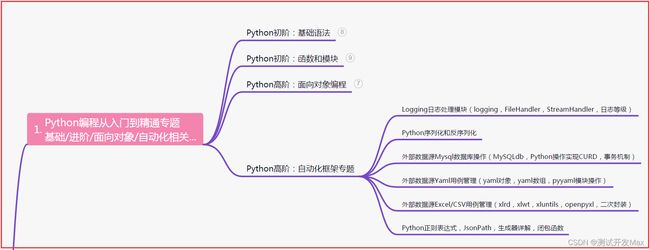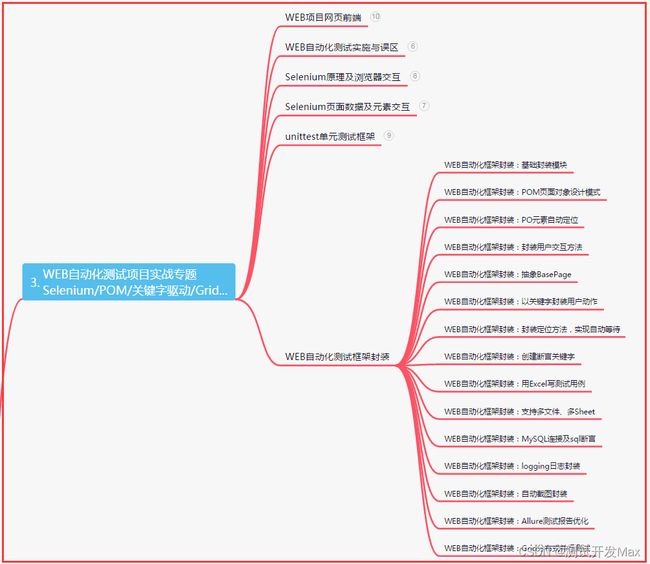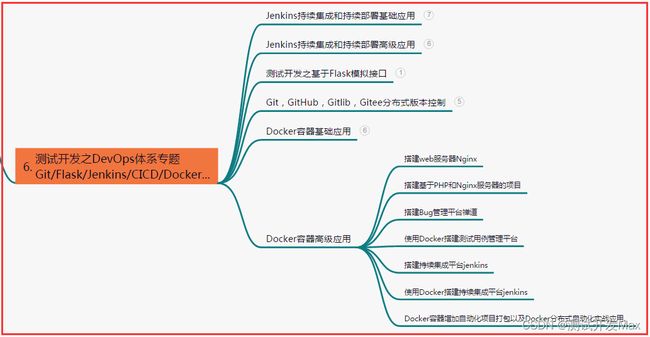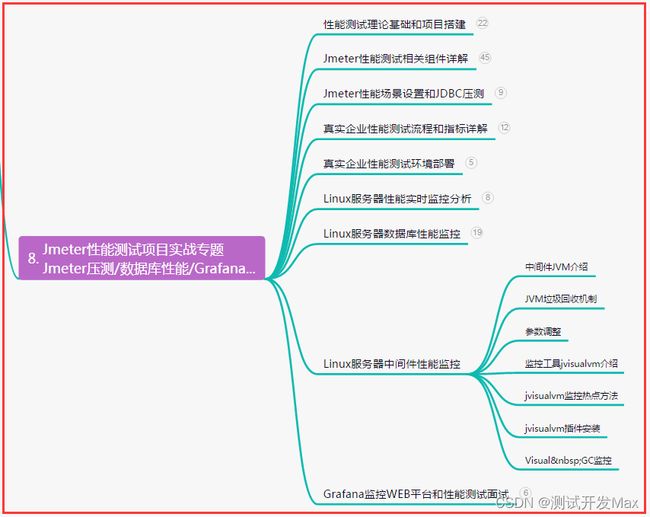全网最详细,Pytest自动化测试框架-Fixture固件实战,你要的都有...
目录:导读
-
- 前言
- 一、Python编程入门到精通
- 二、接口自动化项目实战
- 三、Web自动化项目实战
- 四、App自动化项目实战
- 五、一线大厂简历
- 六、测试开发DevOps体系
- 七、常用自动化测试工具
- 八、JMeter性能测试
- 九、总结(尾部小惊喜)
前言
什么是固件
Fixture 翻译成中文即是固件的意思。
它其实就是一些函数,会在执行测试方法/测试函数之前(或之后)加载运行它们,常见的如接口用例在请求接口前数据库的初始连接,和请求之后关闭数据库的操作。
pytest 中提供了功能更加丰富的Fixture,用于实现setup、teardown功能。
定义方式
使用@pytest.fixture()进行定义,简单示例如下:
import pytest
@pytest.fixture()
def before():
print("连接数据库")
调用方式:
调用单个fixture函数
方式一:使用fixture函数名作为参数
import pytest
@pytest.fixture()
def before():
print("连接数据库")
# 调用before
def test_01(before):
print("执行test_01")
方式二:使用 @pytest.mark.usefixtures(‘fixture函数名’)装饰器
import pytest
@pytest.fixture()
def before():
print("连接数据库")
# 调用before
@pytest.mark.usefixtures('before')
def test_01():
print("执行test_01")
方式三:使用autouse参数自动执行fixture函数
import pytest
# fixture函数定义的时候使用autouse参数,作用域范围内的测试用例会自动调用该fixture函数
@pytest.fixture(autouse=True)
def before():
print("连接数据库")
# 自动调用before
def test_01():
print("执行test_01")
三种方式调用后的结果都如下:
我们可以看到,先执行了fixture函数,再执行测试函数。
1、调用多个fixture函数
import pytest
@pytest.fixture()
def before():
print("连接数据库")
@pytest.fixture()
def before_s():
print("初始化数据")
def test_01(before, before_s):
print("执行test_01")
调用多个 fixture 函数时,由前至后依次执行,所以test_01()调用时先执行before,再执行before_s。
2、对fixture函数重命名
定义fixture函数时,可以利用name参数进行重命名,方便用于调用,示例如下:
import pytest
@pytest.fixture(name='db')
def connect_order_db():
print("连接数据库")
def test_01(db):
print("执行test_01")
使用fixture传递测试数据
在执行完fixture函数后,有时需要将该fixture中得到到某些数据传递给测试函数/测试方法,用于后续的执行。
fixture中提供普通传递和参数化传递两种数据传递方式。
1、普通传递
示例如下:
import pytest
@pytest.fixture()
def before():
print("连接数据库")
return "连接成功!"
def test_01(before):
print("执行test_01")
assert before == "连接成功!"
注意,如果自定义的fixture函数有返回值,需要使用上面说的方式一调用才能获取fixture函数的返回值并传入测试函数中,方式二就无法获取返回值。
2、参数化传递
对fixture函数进行参数化时,需要使用参数params,并且需要传入参数request,简单示例如下:
import pytest
test_params = [1, 2, 0]
@pytest.fixture(params=test_params)
def before(request):
result = request.param
return result
def test_02(before):
print("执行test_02")
assert before
if __name__ == '__main__':
pytest.main()
执行结果:
可以看到,因为所调用的fixture函数进行了参数化,虽然只有一个测试函数但执行了3次。
conftest.py
上面我们举的例子都是把fixture函数放在测试用例模块里面,但如果很多测试模块需要引用同一个fixture函数怎么办,这是时候就需要把它放在命名为conftest的模块里,这样同级或以下目录中的测试用例便能调用这些自定义的fixture函数。
例如,有如下目录:
├─testcase
│ │
│ ├─test_module_01
│ │ test_case_1.py
│ │ test_case_2.py
│ │
│ ├─test_module_02
│ │ test_case_3.py
test_module_01 中的test_case_1.py与test_case_2.py都需要调用同一个 fixture 函数,那么我们只需要在 test_module_01 中新建conftest.py并编写这个fixture函数即可,示例如下:
├─testcase
│ │
│ ├─test_module_01
│ │ conftest.py
│ │ test_case_1.py
│ │ test_case_2.py
│ │
│ ├─test_module_02
│ │ test_case_3.py
conftest.py:
import pytest
@pytest.fixture(autouse=True)
def before():
print("连接数据库")
test_case_1.py:
def test_01():
print("执行test_01")
test_case_2.py:
def test_02():
print("执行test_02")
这样,执行这两个模块的测试用例时会自动先去调用conftest.py中的before()函数。
假设 test_module_02 中的 test_case_3.py 也需要调用这个before()函数,那么这个时候我们就需要在上一层即 testcase 中新建conftest.py并编写这个before()函数,才能在 test_case_3.py 中调用,如下:
├─testcase
│ │ conftest.py
│ │
│ ├─test_module_01
│ │ conftest.py
│ │ test_case_1.py
│ │ test_case_2.py
│ │
│ ├─test_module_02
│ │ test_case_3.py
conftest.py只作用于同级或以下目录中的测试模块,且需要注意,当以下层级中存在了另一个conftest.py,那么以下层级将由另一个conftest.py文件接管。
作用域
pytest 的 fixture 作用域分session、module、class、function四个级别。在定义 fixture 函数的时候通过scope参数指定作用范围,默认为function。
session,每次会话执行一次
module,每个测试模块执行一次
class,每个测试类执行一次
function,每个测试方法执行一次
注意:对于单独定义的测试函数,class、function 都会起作用,可以从下列示例中看出来。
测试目录结构如下:
├─apiAutoTest
│ │ run.py
│ │
│ ├─testcase
│ │ │ conftest.py
│ │ │
│ │ ├─test_module_02
│ │ │ │ conftest.py
│ │ │ │ test_case_3.py
│ │ │ │ test_case_4.py
其中conftest.py代码如下:
import pytest
@pytest.fixture(scope="session", autouse=True)
def session_fixture():
print("这是一个作用于session的fixture")
@pytest.fixture(scope="module", autouse=True)
def module_fixture():
print("这是一个作用于module的fixture")
@pytest.fixture(scope="class", autouse=True)
def class_fixture():
print("这是一个作用于class的fixture")
@pytest.fixture(scope="function", autouse=True)
def function_fixture():
print("这是一个作用于function的fixture")
test_case_3.py代码如下:
import pytest
class TestOrder:
def test_a(self):
print("test_a")
def test_b(self):
print("test_b")
def test_c():
print("test_c")
test_case_4.py代码如下:
def test_e():
print("test_e")
run.py代码如下:
import pytest
if __name__ == '__main__':
pytest.main(["-s"])
运行run.py,结果如下:
collected 4 items
testcase\test_module_02\test_case_3.py
这是一个作用于session的fixture
这是一个作用于module的fixture
这是一个作用于class的fixture
这是一个作用于function的fixture
test_a
.这是一个作用于function的fixture
test_b
.这是一个作用于class的fixture
这是一个作用于function的fixture
test_c
.
testcase\test_module_02\test_case_4.py
这是一个作用于module的fixture
这是一个作用于class的fixture
这是一个作用于function的fixture
test_e
.
============================== 4 passed in 0.04s ==============================
从结果可以看出来:
作用于session的fixture函数只在所有测试用例执行之前调用了一次;
作用于module的fixture函数在每个测试模块执行之前调用了一次;
作用于class的fixture函数在每个测试类执行之前调用了一次;
作用于function的fixture函数在每个测试方法/测试函数执行之前调用了一次;
注意:在定义的测试函数(如test_c()、test_e())执行之前也会调用scope=class的fixture函数。
与 unittest 框架比较,pytest 中的Fixture更加丰富,可扩展性更高。
Fixture还有很多更加优雅的用法用于自动化测试项目中。
| 下面是我整理的2023年最全的软件测试工程师学习知识架构体系图 |
一、Python编程入门到精通
二、接口自动化项目实战
三、Web自动化项目实战
四、App自动化项目实战
五、一线大厂简历
六、测试开发DevOps体系
七、常用自动化测试工具
八、JMeter性能测试
九、总结(尾部小惊喜)
每一次跌倒都是为了更高的飞翔,每一次挫折都是为了更坚强的成长。不惧困难,不畏艰险,勇往直前追逐梦想。坚持奋斗,超越自己,终将引领辉煌的人生之巅!
不管前方有多少艰险和困难,只要心中燃着梦想的火焰,就有无限的力量去闯荡。勇往直前,坚持不懈,唯有奋斗才能书写出属于自己的辉煌篇章!
愿你的内心燃起坚定的火焰,迎接挑战,超越极限。不论前路多坎坷,披荆斩棘,只有拼搏奋斗,才能创造出属于自己的辉煌人生。相信自己,永远不言放弃!

